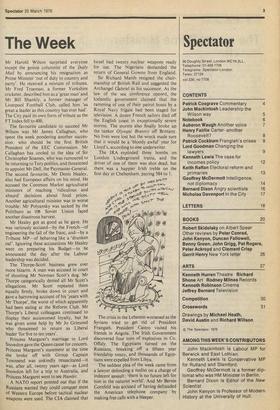The Week
Mr Harold Wilson surprised everyone except the gossip columnist of the Daily Mail by announcing his resignation as Prime Minister 'out of duty to country and party'. He received a mixture of tributes. Mr Fred Trueman, a former Yorkshire cricketer, described him as a 'great man' and Mr Bill Shankly, a former manager of Liverpool Football Club, called him 'as great a leader as this country has ever had'. The City paid its own form of tribute as the FT Index fell to 400.
The favourite candidate to succeed Mr Wilson was Mr James Callaghan, who spent the week pondering another succession: who should be the first British President of the EEC Commission. Mr Callaghan has cooled to the idea of Sir Christopher Soames, who was rumoured to be returning to Tory politics, and threatened to appoint Mr Dell, the Paymaster-General. The second favourite, Mr Denis Healey, also had European affairs on his mind. He accused the Common Market agricultural ministers of reaching 'ridiculous and absurd' decisions about food prices. Another agricultural minister was in worse trouble: Mr Polyansky was sacked by the Politburo as tht Soviet Union faced another disastrous harvest.
Mr Healey got as good as he gave. He was variously accused—by the French—of engineering the fall of the franc, and—by a Tribune MP--of behaving like a 'drunken oaf'. Ignoring these accusations Mr Healey went on preparing his Budget—to be announced the day after the Labour leadership was decided.
The Thorpe-Scott business grew ever more bizarre. A man was accused in court of shooting Mr Norman Scott's dog. Mr Thorpe categorically denied all Mr Scott's allegations. Mr Scott repeated them equally firmly, broke down in court and gave a harrowing account of his 'years with Mr Thorpe', the worst of which apparently had been eating at the Reform Club. Mr Thorpe's Liberal colleagues continued to display their accustomed loyalty, but he was given some help by Mr Jo Grimond who threatened to return as Liberal leader 'for five to ten years'.
Princess Margaret's marriage to Lord Snowdon gave the Queen cause for concern. Princess Margaret's statement at the time she broke off with Group Captain Townsend was unkindly resuscitated—it was, after all, twenty years ago—as Lord Snowdon left for a trip to Australia, and Princess Margaret went to see Hamlet.
A NATO report pointed out that if the Russians wanted they could conquer most of Western Europe before tactical nuclear weapons were used. The CIA claimed that
Israel had twenty nuclear weapons ready for use. The Nigerians demanded the return of General Gowon from England.
Sir Richard Marsh resigned the chairmanship of British Rail and suggested the Archangel Gabriel as his successor. As the law of the sea conference opened, the Icelandic government claimed that the ramming of one of their patrol boats by a Royal Navy frigate had been staged for television. A dozen French sailors died off the English coast in exceptionally severe storms. The storms also finally broke up the tanker Olympic Bravery off Brittany. No lives were lost but the wreck made sure that it would be a 'bloody awful' year for Lloyd's, according to one underwriter.
The IRA exploded three bombs on London Underground trains, and the driver of one of them was shot dead, but there was a happier Irish treble on the first day at Cheltenham, paying 584 to I.
The crisis in the Lebanon worsened as the Syrians tried to get rid of President Frangieh. President Castro visited his friends in Angola. The Irish Government discovered four tons of explosives in Co. Offaly. The Egyptians turned on the Russians, breaking off a fifteen year friendship treaty, and thousands of Egyptians were expelled from Libya.
The saddest plea of the week came from a lawyer defending a nudist on a charge of indecent assault: 'there is no future left for him in the naturist world'. And Mr Bernie Cornfeld was accused of having defrauded the American telephone company by making free calls with a bleeper.


































 Previous page
Previous page